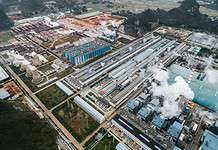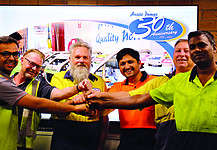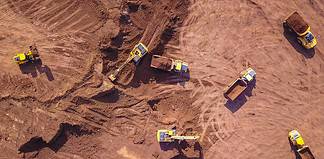The Australian mining industry relies heavily on locally based maintenance engineering companies to quickly repair worn out components, with the highest quality possible. The global pandemic in 2020 dramatically increased both the cost and time required for sending parts overseas for repair, making it imperative to have the latest technology available in Australia.
Melbourne based Avweld Australasia Pty Ltd has long been relied upon by Australian industry for emergency breakdown maintenance and routine hardfacing services. In addition to large scale machining and grinding, they have been applying coatings using the HVOF, DC-plasma and Twin Wire Arc thermal spray processes, as well as robotic MIG, TIG and Plasma Transferred Arc (PTA) welding.
In 2020 they commissioned three new automatic robotic cladding cells equipped with the latest coating and robotic technologies, including a Laser Cladding cell, Dual-tandem-robot twin-wire Lincoln Hyperfill MIG cell, and a dual-tandem-robot automatic TIG cell.
Existing robot welding and thermal spray cells were also upgraded to the same ABB robots to provide maximum flexibility.
High Power Laser Cladding
Laser cladding technology has several advantages compared to traditional MIG or PTA welding. The focused energy density allows for a full metallurgical welded bond, with virtually no heat affected zone. This means that high strength materials can be clad without requiring subsequent stress relief.
The 10kW Coherent D-Series Direct Diode Laser system also offers several advantages compared to previous generation fibre or CO2 lasers. Because the laser beam shaping occurs right at the application point, laser efficiencies are increased compared to previous generation fibre or CO2 lasers.
So coatings can be applied quickly, with full metallurgical bonds, yet still have negligible stress induced to the substrate.
Multiple feedstock material types can also be utilised. Powder can be applied with almost 100% deposit efficiency using a gravity feed system when applying horizontally. For out-of-position laser cladding, a pressure feed powder system is also installed.
The installed hot-wire laser feed technology is also a recent development. The wire is pre-heated before entering the laser beam, meaning the laser power required to melt the wire at the weld pool is significantly lower. This increases both the application speed and reduces substrate heat-input requirements.
The low heat input and extremely flat weld beads provide for minimum distortion and maximum control of weld shape. This means coatings can be applied in a wide range of thicknesses, and material applied for post-weld-grinding is significantly reduced.
Automated MIG Cladding
A newly installed automated MIG hardfacing cell has combined a range of cutting edge technologies and internal R&D to enable the fully automated scanning and cladding of virtually any part. Two x ABB IRB robots operated either independently or in tandem within the same cell. Each has its own independent 2-axis 5 tonne positioner.
3D scanners map the locations and geometry of any part to be coated. The model is then compared to an existing CAD model or coating schematic, and the system is able to fully determine where to apply weld to achieve the correct coating dimensions.
Each welder is fitted with the Lincoln HyperFill system. In this system two separate wires are fed into the same weld tip from a single power source. This allows for increased deposition rates without compromising puddle stability or weld quality.
When using both robots on a single workpiece, weld speeds increase to 30kg per hour, still with minimum heat input. This allows economical and fast repair of worn out components, so they can be returned to the customer faster.
Lathe Upsized
To support the application of new coating technologies to the widest range of workpiece geometries, Avweld have commissioned a significant upgrade in machining and overhead crane capacity.
The European manufactured Poreba lathe means that workpieces up to 30 tonnes, 2m diameter and 12m long can be accurately machined to within exacting tolerances.
Correct Welding Consumables
Having sophisticated material application technology is only half of the story, however. Constant material technology improvements mean having the correct suppliers and stock availability are critical to providing not only timely repairs, but also the best possible material properties.
All materials used at Avweld are sourced from Alloys International Pty Ltd, the sister company co-located in Melbourne, with distribution in Perth and Queensland. Alloys has been in business for 40 years, focusing on the sale of specialised welding consumables for repair and maintenance.
With increased freight costs and leadtimes, having the stock available locally becomes essential. Over the course of 2020 Alloys International doubled local stock capacity to enable uninterrupted supply to customers throughout Australia and New Zealand.
Alloys International calls significantly on the long term relationships with consumable manufacturers such as Voestalpine Bohler Welding to stock a broad range of Bohler fabrication and UTP repair and maintenance welding consumables.
Tungsten Carbide Improvement
For decades, tungsten carbide has been the default choice material for weld overlay abrasion resistance. This would usually be a wire or powder with 60% tungsten carbide, in a nickel matrix, such as Alloys International AI-1779.
Recently, significant improvements have been made to the toughness and hardness possible with tungsten carbide. The AI-1779VC wire improvement stems from the reinforcing of the nickel matrix by the addition of super hard refractory carbides, including vanadium and boron.
The same technique of using hard complex carbides for matrix strength improvement have also allowed for the development of a range of cheaper tungsten and chrome carbide wires.
For example, AI-1541VC wire contains only 40% tungsten carbide, and is in an iron matrix instead of nickel. But the reinforcement of the matrix with vanadium and boron carbides propels the abrasion resistance very close to that of the higher alloy wires, despite a 30% reduction in cost.
About Avweld and Alloys International
Avweld Australasia Pty Ltd is a privately owned Australian company based in Melbourne, Australia. Alloys International is the welding consumable sales division of the same group, with additional warehousing in Perth and Queensland.
Combined, the group employs approximately 50 staff, with focus on life extension technologies such as hardfacing, laser cladding, thermal spray, machining and grinding.
SOURCE
Avweld
P: +61 3 9369 0088
E: [email protected]
W: www.avweld.com.au
Alloys International
P: +61 3 8368 2222
E: [email protected]
W: www.alloysint.com.au








































